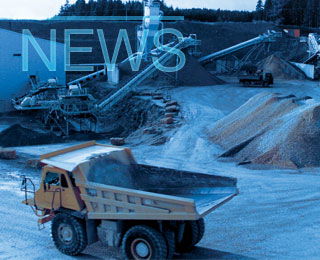Entsorga West Virginia announced the groundbreaking of the US’s first resource recovery facility utilising Mechanical Biological Treatment (MBT). The state-of-the-art waste-to-solid fuel plant will be located in Martinsburg, WV, and is expected to be operational in early 2017. Entsorga WV is a joint venture between Apple Valley Waste Technologies, LLC, Entsorga USA and Chemtex International.
“This is a significant milestone for the United States and we are truly thrilled to be providing this proven technology to convert waste into an EPA recognised alternative fuel source,” stated Pietro Cella Mazzariol, CEO & Director, Entsorga.
By utilising the HEBioT MBT system, Entsorga WV will recover biomass, plastics and other carbon based materials from the mixed municipal solid waste (MSW) stream and convert them into a safe alternative fuel source. When processing the MSW, Entsorga WV will remove other valuable recyclable commodities such as ferrous and non-ferrous metals utilizing its proprietary system.
The MSW received will be converted to a clean-burning alternative fuel (Solid Recovered Fuel or SRF), which will be used as an alternative or supplement to fossil fuels. It is ideal for co-processing plants such as cement kilns and steel mills as a source for the production of renewable energy.
Essroc long-term contract
At capacity, the plant will be capable of producing approximately 50,000tpa of SRF which will be delivered to the Essroc cement plant and used in conjunction with coal in the production of Portland cement. The companies have entered into a long-term contract for the provision and acceptance of the SRF.
The use of SRF from the Entsorga process has been proven to generate emissions comparable to or less than those found in traditional US fossil fuels. The reduction of waste that will be disposed of in landfills as a result of the Entsorga facility will result in a greenhouse gas (GHG) emission reduction of 28,000tpa of CO2e.
The Entsorga MBT technology creates an Environmental Protection Agency (EPA)-recognised “engineered fuel.” This means that facilities using this specific SRF, as an alternative fuel, will not be subject to the EPA incinerator rule (Commercial/Industrial Solid Waste Incinerator Rule) and that the SRF meets certain standards that other fuels cannot meet.
The vertical integration of the model that will be deployed in Berkeley County further adds to the plant’s innovativeness and functionality. Residential waste collected by Apple Valley Waste, which was previously destined to be landfilled, will be transported locally to a facility owned partially by the hauler and converted and used within the county as an alternative, renewable fuel. Additionally, a minimum of 100 temporary jobs will be created during the construction period of the plant and up to 20 permanent positions once it is operational.
“We are extremely excited about the future of Apple Valley Waste and Entsorga. With the support of Berkeley County and the State of West Virginia, Apple Valley Waste will set an example as the “new age” integrated waste company. We will collect and dispose of waste to be used to manufacture a clean alternative fuel and then deliver it to its ultimate user all within the same county of West Virginia. To my knowledge this is unprecedented” stated John Decker, CEO of Apple Valley Waste.
“The Berkeley County Solid Waste Authority is extremely enthusiastic about the Entsorga project,” adds Clint R Hogbin, the authority’s chairman. “The project represents the future of solid waste management, as this new facility may enable Berkeley County to become the first in the State to exceed West Virginia’s 50 per cent landfill diversion goal for its residential waste stream.”
“The Entsorga technology is revolutionary,” stated Frank E Celli, director of Entsorga and chairman of the Board, Apple Valley Waste. “We believe this is a ‘sneak peek’ at the next generation of waste collection and disposal and one that will have a meaningful impact on the country’s fossil fuel dependency.”

Brazil's cement market expands 5% in March
Cement sales in Brazil increased 5.2 per cent YoY to 5.265Mt in March 2025 from 5.006Mt in March...